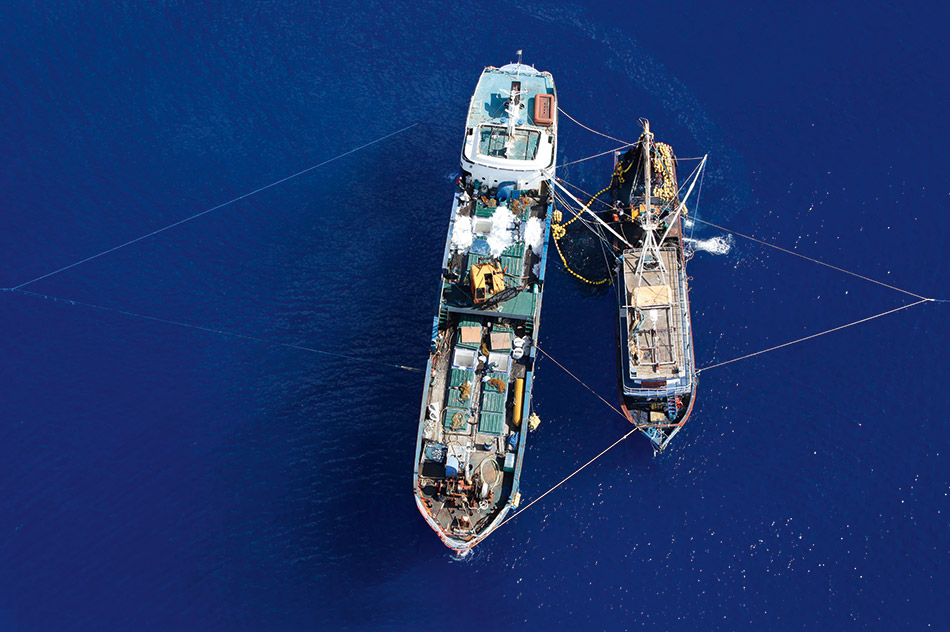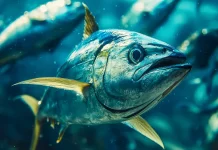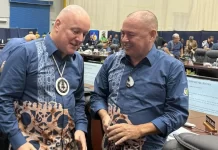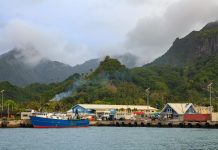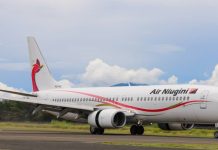The SUN FLOWER 7, a fish carrier sailing under the flag of South Korea, was recently denied permission to unload a tuna catch of over 4,000 kgs, estimated to be worth 250 million baht (US$7.2 million), in Bangkok.
However, subsequent Environmental Justice Foundation (EJF) investigations have revealed this was not an isolated incident. EJF investigations have revealed this was not an isolated incident.
The SUN FLOWER 7 is alleged to have retrieved fish aggregation devices (FADs) in Kiribati’s Exclusive Economic Zone.
The vessel had not been authorised to retrieve these devices in Kiribati’s waters, meaning any such activity would be firmly illegal.
New EJF data show for the first time that an additional ten vessels have been linked to similar activities.
The use of FADs in the area is regulated given their links to tuna overfishing, high bycatch, and capture of juvenile tuna, as well as the risk of illegal, unreported and unregulated (IUU) fishing. This means that the unauthorised deployment or retrieval of FADs threatens the sustainability of fisheries and the people who depend on them, says EJF.
EJF conducted this research through studying vessel tracking data for hundreds of Korean-owned and Korean-affiliated carrier vessels to detect behaviours that could indicate similar activities. All ten are either flagged to South Korea, or have beneficial ownership connections or affiliations with South Korean companies. Several of them appear to have been involved in the placement or retrieval of FADs on multiple occasions over the last two years.
Example vessel tracking: Potential FAD deployment activity for the 7th October – 23rd October 2021 is shown. The vessel’s depicted location is the 8th October 2021. A significant portion of this activity was conducted within Kiribati’s EEZ. The vessel’s next port of call was Busan, arriving on the 29th December 2021.
The findings from EJF, in collaboration with Starboard Marine Intelligence, show a systemic lack of compliance with FAD regulations across the Western and Central Pacific Ocean. EJF now urges other port states to follow Thailand’s example, ensuring strong port measures regionally and internationally to keep out seafood products linked to IUU fishing.
Without this, those responsible will continue to benefit from the destruction of ocean ecosystems and the flouting of international fisheries management rules, according to EJF.
EJF also calls on the South Korean government to take strong action to review all vessel monitoring information and communications records for the fish carriers in question, and take appropriate action in accordance with the applicable laws. Sanctions for the SUN FLOWER 7 are currently being considered and will be decided in early May in Korea. However, full transparency – as outlined in the Global Charter for Transparency – is needed to avoid repeat cases, says the NGO. This would enable fisheries managers, enforcement teams and all stakeholders to eradicate illegal and unsustainable fishing, thereby supporting law abiding fishing vessels and operations.
More broadly, EJF encourages all states worldwide to adopt the principles of the Global Charter for Fisheries Transparency. This is a set of practical, cost-effective measures to reduce the risk of illegal fishing, human rights abuses and ocean ecosystem collapse.
Steve Trent, EJF CEO and Founder, said: “I applaud the Thai authorities for taking action against illegal fishing by preventing the SUN FLOWER 7 from unloading in Bangkok. The strong precedent this sets should be followed by all port states for the other vessels we have linked to similar fishing activities.”
“We all benefit from legal, sustainable, ethical fisheries, and every port and flag state can help to bring them about. In particular, I call on the South Korean government to take decisive action to thoroughly investigate its fleet, improve transparency and ensure compliance with international regulations. For a safe, sustainable planet, enshrining the principles of the Global Charter for Transparency into law should be a priority for South Korea and every nation across the globe.”
Five of the vessels mentioned conducted their activities within Kiribati’s EEZ, whilst the other five did so on the high seas, carefully following island nation boundaries.
Two vessels were also found to have conducted potential FAD deployment or retrieval during the FAD closure which ran in 2021 and 2022 from the 1st July – 30th September, as well as November and December.
EJF recommends that South Korea scrutinise its carrier fleet’s vessel monitoring system data to verify how many other vessels have exhibited similar behaviour and warrant further investigation. It should also examine the extent of communication with the tuna purse seiners which actually benefit from FAD deployment.
Other important steps for transparency include compliance checks to ensure all carrier vessels are in line with relevant flag State, RFMO and coastal State legislation on the deployment and retrieval of FADs. Publishing a dedicated licence list for fishing carrier vessels and sanction list for all South Korean vessels would also help to prevent IUU fishing.
SOURCE: EJF/PACNEWS






